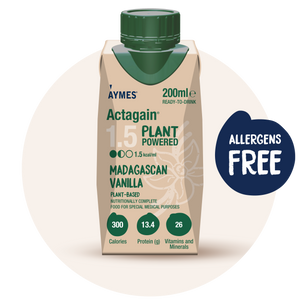
Addressing rising demand and overcoming integration challenges
As plant-based diets gain popularity for health, ethical, and environmental reasons, the demand for plant-based oral nutritional supplements (ONS) in medical nutrition is also increasing. Data suggests that one in three people in the UK now drink plant-based milk alternatives,1 and 6.4% of UK adults plan to follow a vegan diet by 2025.2 This shift in consumer preferences is not only reflective of broader dietary trends but also highlights a growing need for sustainable solutions in healthcare.
In medical nutrition, plant-based ONS offers a significant opportunity to meet these rising demands while aligning with the NHS Net Zero targets. Pilot research indicates that well-formulated plant-based ONS can effectively support patients’ nutritional needs, improving intake of energy, protein, and micronutrients, as well as reducing the risk of malnutrition.3
Integrating plant-based ONS into clinical practice does however come with challenges.
Concerns about nutrient adequacy and the taste and formulation of plant-based products are common. Despite the concerns, studies suggest with proper formulation, plant-based ONS drinks are well-tolerated and highly acceptable to patients, offering a viable alternative to traditional dairy-based options.3,4 That said, personalised care and monitoring along with clinical judgement are essential to ensure patients’ individual needs are met.
Another challenge lies in the accessibility and availability of plant-based products. Limited product ranges in clinical settings, combined with procurement and cost barriers, hinder widespread adoption. Collaboration between healthcare professionals, NHS trusts, and manufacturers is crucial to expanding these options and ensure equitable access for patients.
Despite these challenges, the integration of plant-based ONS into medical nutrition is a necessary step towards improved service-user choice and a more sustainable future. By embracing plant-based alternative as viable tool in their toolkit, dietitians and other healthcare professionals can meet patient preferences, support sustainability goals, and contribute to a healthier planet and population.5
















